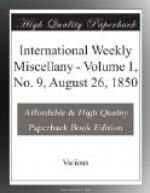left to be placed
en subsistence in the 2d regiment
of light infantry. On the 11th of October of the
same year he was admitted into the 1st company of
sous-officiers sedentaires, and, in 1846, into
the 5th company of Veteran Sub-Officers. The last
three of these companies having just been suppressed
by the Minister of War, Kolombeski was placed
en
subsistence in the 61st regiment of the line,
received a retiring pension by decree of May 17, 1850,
and the Minister authorized his admission into the
Invalides. Kolombeski is, therefore, more than
120 years of age; he reckons seventy-five and a half
years of service, and twenty-nine campaigns. He
enjoys good health, is strong and well made, and does
not appear to be more than seventy or eighty.
He performed every duty with big comrades of the 5th
company of Veterans, When King Louis Philippe visited
Dreus, Kolombeski was presented to him, who, taking
the decoration from his breast, presented it to the
veteran soldier. This is the most astonishing
instance of longevity that has, perhaps, been ever
known in the army. The Marshal Governor of the
Invalides ordered that Kolombeski should be brought
to him on his arrival; but, as the old soldier was
fatigued, he was taken to the infirmary, and the Governor,
informed of it, went to his bedside with General Petit,
the commandant of the hotel, and addressed the veteran
in the kindest manner. The Governor has issued
an order that, for the future, all centenarian soldiers
admitted into the hospital shall mess with the officers,
in order to show his respect for their age, and for
the long services they have rendered to the state.—
Galignani’s
Messenger.
* * * *
*
ANECDOTE OF LORD BROUGHAM.
The “Life of the Rev. Dr. Hugh Heugh”
has a description of an interview which a deputation
of Scotch dissenters had some years ago with Lord
Brougham. The Scotsman adds, from its private
knowledge, some odd incidents of the affair.
His lordship, on coming out of the court to meet the
deputation, immediately on being informed of their
object, burst out in a volley of exclamations to the
effect that, but for dissent, there would be “No
vital religion—no vital religion, gentlemen,
no vital religion.” While pouring forth
this in a most solemn tone, he was all the while shaking
violently the locked doors of a lobby full of committee
rooms, into one of which he wished to find entrance,
and calling for an absent official not only in passionate
tones, but in phraseology which the reverend deputation,
at first unwilling to trust their own ears, were at
last forced to believe was nothing better than profane
swearing. At last, he suddenly drew himself up
to the wall opposite a locked door, and with a tremendous
kick, smashed the lock, and entered (exclaiming, first
in a vehement and then in a solemn tone, but without
pause) “—that fellow! where the ——
does he always go to! No vital religion, gentlemen,
no vital religion—no, no, no.”




